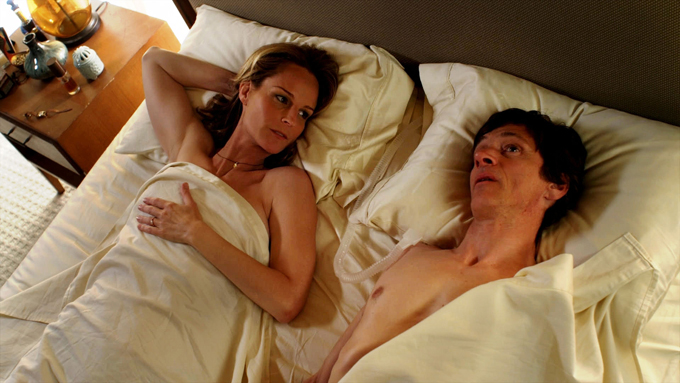Inspired by the life and writings of Mark O’Brien — a polio-stricken but determined journalist and poet confined to an iron lung since age six — “The Sessions” offers a less comprehensive look at O’Brien’s life than Jessica Yu‘s excellent documentary “Breathing Lessons,” but instead focuses on a small sliver of his life and living. In 1988, O’Brien, then 38, made a decision to explore his own sexuality — despite his paralysis — in part inspired by his research into a story on sex and disability. Unsure about his ability to forge a relationship — and concerned, as he puts it to his Catholic Priest and confessor, that he’s “approaching his use-by date,” O’Brien looks into hiring a sex surrogate. The surrogate, Cheryl Cohen Greene, explains that she’s not a prostitute, but a therapist — she and Mark will have six sessions, and then terminate their relationship. It sounds complex. It gets more so.
 Written and directed by Ben Lewin — himself a polio survivor — “The Sessions” sounds like standard-issue inspirational bio-pic stuff, and to a certain point it is. But two things make “The Sessions” stand out. One is the level of acting; O’Brien is played by John Hawkes, Cohen Greene by Helen Hunt, and Father Brendan by William H. Macy. These three actors, to be sure, could adapt the classified ads and be riveting, but they each take the right approach to this material; neither melodramatic nor too underplayed, not without humor and not without gravity.
Written and directed by Ben Lewin — himself a polio survivor — “The Sessions” sounds like standard-issue inspirational bio-pic stuff, and to a certain point it is. But two things make “The Sessions” stand out. One is the level of acting; O’Brien is played by John Hawkes, Cohen Greene by Helen Hunt, and Father Brendan by William H. Macy. These three actors, to be sure, could adapt the classified ads and be riveting, but they each take the right approach to this material; neither melodramatic nor too underplayed, not without humor and not without gravity.
The other is that, while we all know sex is more than boobs and bits and butts, it also does include those things, and “The Sessions” does not hide behind euphemism or gentle cutaways, montages or misty light. Cheryl talks with Mark, supportively and sensitively, about the mechanics of what he can and cannot do, and Mark talks with Cheryl, with self-deprecation and scared caution, about his desires and his doubts. For an American film to talk about sex — never mind sex for the disabled — in an even remotely adult way is improbably rare, and you appreciate the forthrightness of the film and a here-are-the-facts approach to sex and nudity. It’s also interesting that Mark is a devout Catholic who goes to see Father Brendan before he looks into hiring Cheryl, at first to get his approval: “I was kind of hoping I could get a quote in advance.” Father Brendan takes a William H. Macy pause — perfectly timed for both comedy and drama — and says “In my heart, I think He’ll give you a pass on this one.” When it comes to sex, Mark has two barriers: His body says he can’t, and his soul says he shouldn’t, and Cheryl and Father Brendan help him with those two seemingly insurmountable problems.
 The fact of the matter is that “The Sessions” is at best talky and static; Mark talks to Father Brendan or Cheryl, and then ping-pongs back to the other. Films like “The Sea Inside” or “The Diving Bell and the Butterfly” have put paralyzed protagonists in the palaces of their memory and imagination, free to roam; “Whose Life Is It Anyway?” had a young Richard Dreyfuss and the then-controversial question of self-elected suicide to guide it. “The Sessions” lacks those things, but it does look, with real intelligence and humanity, at the way sex can, and must, be part of a life lived independently, and is less a cause for shame than a way to explore who we are. Hawkes’ performance is just showy enough to possibly get an Oscar nod, but it’s got the kind of honesty and heart that’s worth more than a dozen gold statues. [B]
The fact of the matter is that “The Sessions” is at best talky and static; Mark talks to Father Brendan or Cheryl, and then ping-pongs back to the other. Films like “The Sea Inside” or “The Diving Bell and the Butterfly” have put paralyzed protagonists in the palaces of their memory and imagination, free to roam; “Whose Life Is It Anyway?” had a young Richard Dreyfuss and the then-controversial question of self-elected suicide to guide it. “The Sessions” lacks those things, but it does look, with real intelligence and humanity, at the way sex can, and must, be part of a life lived independently, and is less a cause for shame than a way to explore who we are. Hawkes’ performance is just showy enough to possibly get an Oscar nod, but it’s got the kind of honesty and heart that’s worth more than a dozen gold statues. [B]
This is a reprint of our review from the Sundance Film Festival.

